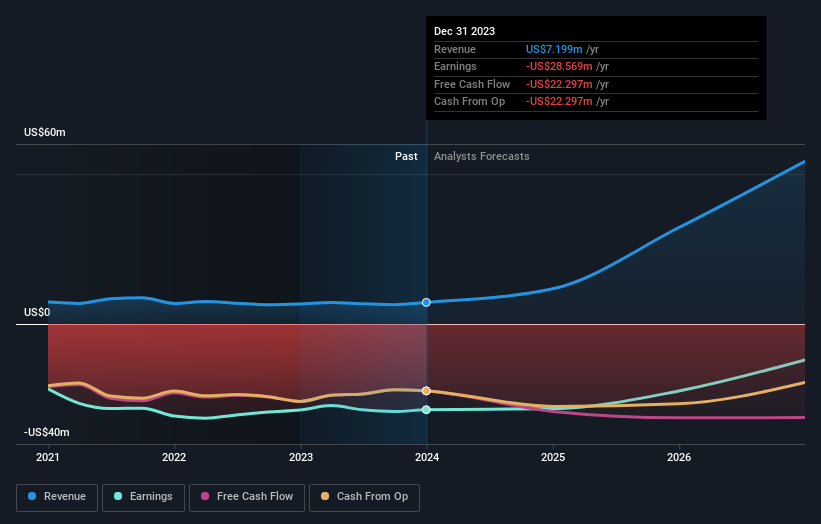In the wake of Profound Medical Corp.'s (TSE:PRN) latest CA$31m market cap drop, institutional owners may be forced to take severe actions
Key Insights
Given the large stake in the stock by institutions, Profound Medical's stock price might be vulnerable to their trading decisions
A total of 15 investors have a majority stake in the company with 50% ownership
A look at the shareholders of Profound Medical Corp. (TSE:PRN) can tell us which group is most powerful. The group holding the most number of shares in the company, around 46% to be precise, is institutions. That is, the group stands to benefit the most if the stock rises (or lose the most if there is a downturn).
As a result, institutional investors endured the highest losses last week after market cap fell by CA$31m. This set of investors may especially be concerned about the current loss, which adds to a one-year loss of 40% for shareholders. Often called “market movers", institutions wield significant power in influencing the price dynamics of any stock. As a result, if the downtrend continues, institutions may face pressures to sell Profound Medical, which might have negative implications on individual investors.
In the chart below, we zoom in on the different ownership groups of Profound Medical.
See our latest analysis for Profound Medical
What Does The Institutional Ownership Tell Us About Profound Medical?
Institutions typically measure themselves against a benchmark when reporting to their own investors, so they often become more enthusiastic about a stock once it's included in a major index. We would expect most companies to have some institutions on the register, especially if they are growing.
As you can see, institutional investors have a fair amount of stake in Profound Medical. This implies the analysts working for those institutions have looked at the stock and they like it. But just like anyone else, they could be wrong. If multiple institutions change their view on a stock at the same time, you could see the share price drop fast. It's therefore worth looking at Profound Medical's earnings history below. Of course, the future is what really matters.
We note that hedge funds don't have a meaningful investment in Profound Medical. Looking at our data, we can see that the largest shareholder is Gagnon Securities, LLC with 9.5% of shares outstanding. Meanwhile, the second and third largest shareholders, hold 5.2% and 4.9%, of the shares outstanding, respectively. Additionally, the company's CEO Arun Menawat directly holds 1.9% of the total shares outstanding.
After doing some more digging, we found that the top 15 have the combined ownership of 50% in the company, suggesting that no single shareholder has significant control over the company.
While studying institutional ownership for a company can add value to your research, it is also a good practice to research analyst recommendations to get a deeper understand of a stock's expected performance. Quite a few analysts cover the stock, so you could look into forecast growth quite easily.
Insider Ownership Of Profound Medical
The definition of an insider can differ slightly between different countries, but members of the board of directors always count. Management ultimately answers to the board. However, it is not uncommon for managers to be executive board members, especially if they are a founder or the CEO.
Insider ownership is positive when it signals leadership are thinking like the true owners of the company. However, high insider ownership can also give immense power to a small group within the company. This can be negative in some circumstances.
We can report that insiders do own shares in Profound Medical Corp.. In their own names, insiders own CA$22m worth of stock in the CA$246m company. It is good to see some investment by insiders, but we usually like to see higher insider holdings. It might be worth checking if those insiders have been buying.
General Public Ownership
The general public-- including retail investors -- own 45% stake in the company, and hence can't easily be ignored. This size of ownership, while considerable, may not be enough to change company policy if the decision is not in sync with other large shareholders.
Next Steps:
While it is well worth considering the different groups that own a company, there are other factors that are even more important. For example, we've discovered 4 warning signs for Profound Medical (1 can't be ignored!) that you should be aware of before investing here.
But ultimately it is the future, not the past, that will determine how well the owners of this business will do. Therefore we think it advisable to take a look at this free report showing whether analysts are predicting a brighter future.
NB: Figures in this article are calculated using data from the last twelve months, which refer to the 12-month period ending on the last date of the month the financial statement is dated. This may not be consistent with full year annual report figures.
Have feedback on this article? Concerned about the content? Get in touch with us directly. Alternatively, email editorial-team (at) simplywallst.com.
This article by Simply Wall St is general in nature. We provide commentary based on historical data and analyst forecasts only using an unbiased methodology and our articles are not intended to be financial advice. It does not constitute a recommendation to buy or sell any stock, and does not take account of your objectives, or your financial situation. We aim to bring you long-term focused analysis driven by fundamental data. Note that our analysis may not factor in the latest price-sensitive company announcements or qualitative material. Simply Wall St has no position in any stocks mentioned.

 Yahoo Finance
Yahoo Finance 

